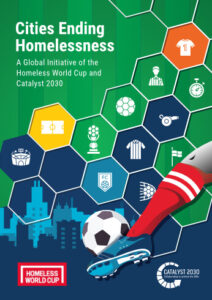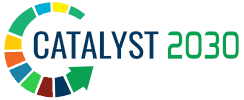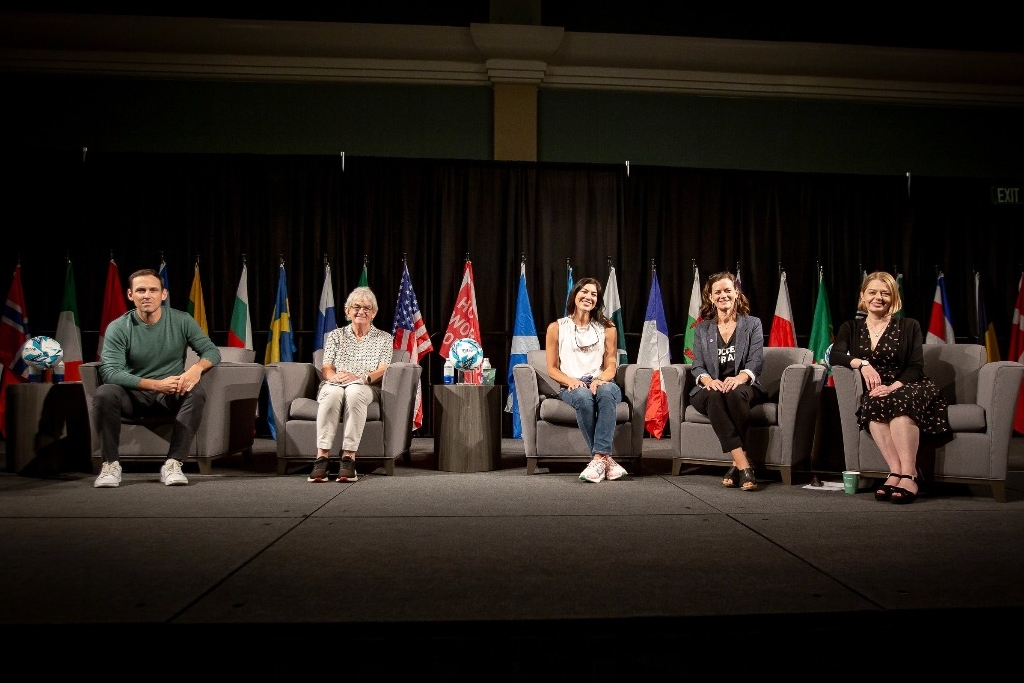Cities Ending Homelessness, a C2030 and Homeless World Cup initiative
The launch of the Cities Ending Homelessness project was one of the highlights of the symposium held during the recent Homeless World Cup in Sacramento, California (8 -15 July). The ground-breaking initiative is a partnership between the Homeless World Cup Foundation and Catalyst 2030, bringing global cities together to share their ideas and solutions, and the launch was attended by representatives from cities all around the world.
A major part of the project is to listen to the voices of people who have experienced homelessness. During the event two current players and two former players described how playing football and getting involved in the Homeless World Cup had helped them turn their lives around. One speaker, Ed Kiwa, told how he had been planning to end his own life when a couple of guys came up and asked him if he wanted to ‘kick a ball around’ with them and a few of their friends. When he “ran out of excuses,” Ed went along for a game, and soon afterwards went on to play for Canada at the Homeless World Cup in 2012, returning six years later as a referee, a new person hungry for life.
Another speaker was the former US soccer star Hope Solo, who was the goalkeeper in the national team which won the World Cup in 2015 and two Olympic gold medals. Hope revealed that she had also experienced what homelessness means – her father was homeless for several years in Seattle while she was growing up. “Struggle builds strength as long as you have the courage to face it,” she said, describing how her father brought joy to her life despite all the problems he had as a Vietnam War veteran who “didn’t fit in” to conventional life and experienced poor mental health. As someone who had fought for years for equal pay for women in professional soccer, Hope also said that “social change starts with a little idea and takes patience and hard work” to get a result.
Mel Young, the co-founder of the Homeless World Cup and a member of Catalyst 2030, talked about the power of the tournament, and how it helped destroy the stereotypes of homeless people by showing them as football stars, changing homeless people’s lives and changing views of homelessness. “We wanted to create an event that was a platform for change,” Mel explained.
Much of the discussion at the symposium focused on housing and health. California-based paediatrician Dr Shannon Thyne highlighted not just the physical and psychological effects of childhood trauma on later life, but also the huge financial costs of adverse childhood experiences, estimated at $1.3 trillion for the USA alone. “Screening is important,” she said, “but action is needed. Research gives lots of data but it doesn’t always take account of reality.”
Professor Suzanne Fitzpatrick of Heriot-Watt University in Scotland talked about “what works and what doesn’t work” in trying to address the global homelessness problem, based on research carried out in cities all around the world. As well as pointing out the need for more resources, including the provision of housing and wraparound support, Suzanne said, “You can make a different political choice. We know the scale of homelessness and also how to deal with it, but we need a collective effort, learning from each other, and we need the political will.”
Mel posed the question, “Is homelessness is a housing problem?” In answer he explained that, “Houselessness is different to homelessness, which is not just the loss of bricks of mortar but an emotional disconnection.” He concluded by announcing the Cities Ending Homelessness project, “We want to build on this to give a voice to homeless people and take steps to positive action. Please join our movement and let’s work together to create a world where homelessness no longer exists.”

Where to read Cities Ending Homelessness
Read the Cities Ending Homelessness – A Global Initiative of the Homeless World Cup and Catalyst 2030 report on the Catalyst 2030 website.

